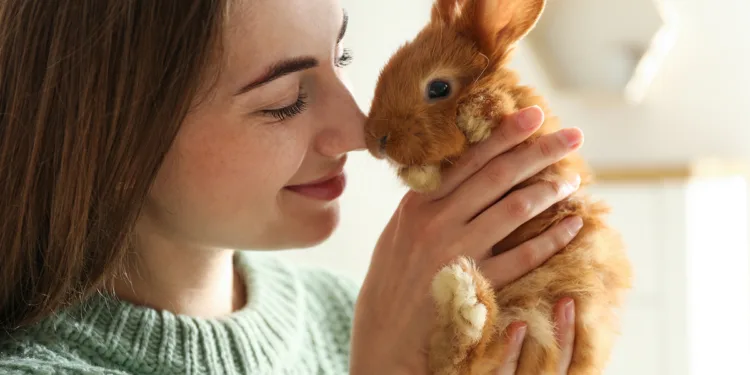Adore rabbits but not sure if they are the pet for you? This complete guide to owning, loving and caring for them will help you decide.
Bunnies bring joy to many British homes, however, unfortunately the favour is not always returned with rabbits also being one of the UK’s most neglected pets. Giving pet owners the benefit of the doubt, let’s assume much of this mistreatment is borne from people simply underestimating the care these bouncing beauties require, particularly as many are acquired at the whim of children to have no real idea of the commitment ahead of them.
With that in mind, the guide below is designed to make would-be bunny parents aware of a rabbit’s needs to give them the most fulfilling life possible and the opportunity to be best pet in return.
Where they live
Unfortunately, if you only have a very small outdoor space, a rabbit probably isn’t the pet for you. A rabbit’s home is an essential aspect of their happiness and there are certain requirements that are non-negotiable.
Bear in mind that a small hutch will not offer your rabbit enough room. Your pet will need to be able to stand on its hind legs inside the hutch with a large run that is either attached to it or that you can move it into during the day. A rabbit without enough space will become withdrawn and unhappy.
The hutch must be totally secure from predators, resistant to the elements – a tarpaulin is ideal for this – and include a separate, dark space for sleep. Bedding must be changed regularly and made of something natural such as hay that the rabbit can eat. It is also important to create a space for the rabbit to go to the toilet, such as a small tray filled with shredded paper.
What they eat
Rabbits have quite a delicate digestive system, so be careful what you feed them. Grass or hay is a staple of their diet, and they will enjoy washed, leafy greens as part of their daily diet. Try to buy a complete rabbit food over the cheaper cereal alternatives as these are often high in sugar and low on nutrients. While rabbits really enjoy carrots and other root vegetables, their high sugar content means they should only be an occasional treat. A fresh supply of clean water is also vital to your furry friend’s overall health.
How they thrive
Rabbits are intelligent, lively and loving creatures and as such need stimulation and social interaction. Give them plenty of things to do such as tunnels to explore, wood to chew on and toys to play with. If you have space, a sandpit or somewhere for your rabbit to dig would be much appreciated. Rabbits also prefer the company of other rabbits – though not guinea pigs – and it is worth buying two at once while they are both young as putting two older bunnies together can lead to fights.
Consider getting your rabbit neutered as this has proved to have better behaviour outcomes for them and be sure to get them vaccinated against myxomatosis and VHD.
As well as making sure their home is regularly cleaned and stocked with food and water, you also need to do basic grooming to them, though never bathe your rabbit as they are not keen on water. A long-haired breed will need to be brushed daily and clipping claws regularly is also important.
When it comes to general affection, handling your rabbit most days and ensuring they feel loved and safe will give you both the best shot at a happy and fulfilling life together.










